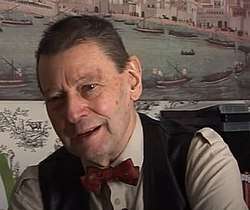Norman Routledge
Norman Arthur Routledge (7 March 1928 – 27 April 2013) was a British mathematician and schoolteacher.[3][4] He was a personal friend of fellow mathematician Alan Turing (1912–1954).
Norman Arthur Routledge | |
|---|---|
 | |
| Born | 7 March 1928 |
| Died | 27 April 2013 (aged 85) London, England |
| Nationality | British |
| Citizenship | United Kingdom |
| Education | Glendale County School |
| Alma mater | King's College, Cambridge |
| Known for | Recursive sets |
| Scientific career | |
| Fields | Mathematics |
| Institutions | Royal Aircraft Establishment, National Physical Laboratory, King's College, Cambridge, Eton College |
| Thesis | Recursurive Sets[2] (1954) |
| Influences | Albert Ingham, Alan Turing |
| Influenced | Timothy Gowers, Stephen Wolfram |
Life and career
Norman Routledge was born near Alexandra Park, north London, England.[4] He was educated at Glendale County School, Wood Green, followed by King's College, Cambridge, where he read Mathematics. At Cambridge, he was supervised by Albert Ingham FRS (Fellow of King's College, 1930–65) and Kendall Dixon. He gained a first class degree in 1949 and went on to study for a PhD degree.
He taught as a scientific officer at the Royal Aircraft Establishment, RAE Farnborough, and the National Physical Laboratory (NPL), Teddington, for his compulsory national service, before becoming a Fellow in Mathematics back at King's College in Cambridge.[4] He was a friend of the mathematician and codebreaker Alan Turing (also at King's College and NPL). Alan Turing wrote personal letters to Routledge towards the end of his life. After his arrest and before his trial, he sent the following cryptic syllogism to Routledge in 1952:[5][6][7][8]
Turing believes that machines think
Turing lies with men
Therefore machines cannot think
In 1957, Rouledge was photographed by Antony Barrington Brown. The photograph is now in the collection of the National Portrait Gallery, London.[9]
In 1959, Sir Robert Birley, Headmaster at Eton College, asked him for a recommendation of any promising students for a mathematics teaching post and he suggested himself. He was considered an inspirational teacher,[4] teaching among others Timothy Gowers FRS (later Rouse Ball Professor of Mathematics at Cambridge and a Fields Medallist) and Stephen Wolfram (inventor of the Mathematica mathematical software) at Eton.[10][11][12] Later in his life, he taught music for the Salvation Army community in Bermondsey, southeast London.[4]
In 1992, Routledge was interviewed in the BBC programme The Strange Life and Death of Dr Turing.[13][14] Routledge was a ranconteur, including on his personal life.[15] In retirement towards the end of his own life, he was able to be more openly gay.[4]
Selected publications
- Routledge, N. A. (1952). "A result in Hilbert space". The Quarterly Journal of Mathematics. 3 (1). pp. 12–18. doi:10.1093/qmath/3.1.12.
- Routledge, N. A. (April 1953). "Ordinal recursion". Mathematical Proceedings of the Cambridge Philosophical Society. 49 (2). pp. 175–182. doi:10.1017/S0305004100028255.
References
- Routledge, Norman. "The Eton Headmaster – 'Red' Robert Birley". Web of Stories – Life Stories of Remarkable People. YouTube. Retrieved 15 April 2020.
- "N. A. Arthur Routledge". Mathematics Genealogy Project. North Dakota State University. Retrieved 15 April 2020.
- "Norman Arthur Routledge". MacTutor History of Mathematics archive. University of St Andrews. Retrieved 15 April 2020.
- Dalyell, Tam (29 May 2013). "Norman Arthur Routledge: Inspirational teacher and mathematician". The Independent. Retrieved 15 April 2020.
- "LGBT History Month in King's Library". King's Treasures – Special Collections of King's College, Cambridge. Library and Archives of King’s College, Cambridge. 14 February 2019. Retrieved 15 April 2020.
- Turing, Alan (1952). "Letter to Norman Routledge". Genius. Retrieved 15 April 2020.
- Leavitt, pp. 5, 269.
- Turing, D., pp. 246–7.
- "Norman Routledge (1928-2013), Mathematician and teacher at Eton College". UK: National Portrait Gallery, London. Retrieved 15 April 2020.
- Wolfram, Stephen (27 August 2019). "A Book from Alan Turing… and a Mysterious Piece of Paper". Stephen Wolfram Writings. Retrieved 15 April 2020.
- Crowell, Rachel J. (23 September 2019). "Wolfram Blogging". AMS Blogs. American Mathematical Society. Retrieved 15 April 2020.
- Copeland et al., p. 44.
- "The Strange Life and Death of Dr Turing (1992)". British Film Institute. Retrieved 15 April 2020.
- Copeland et al., p. 471.
- "Norman Routledge (Teacher)". Web of Stories – Life Stories of Remarkable People,. YouTube. Retrieved 15 April 2020.CS1 maint: extra punctuation (link)
Bibliography
- Copeland, B. Jack; Bowen, Jonathan P.; Wilson, Robin; Sprevak, Mark (2017). The Turing Guide. Oxford University Press. pp. 37, 44, 471. ISBN 978-0-19-874783-3.
- Hodges, Andrew (1983). Alan Turing: The Enigma. Simon & Schuster. pp. 372, 395, 476, 483. ISBN 0-671-49207-1.
- Leavitt, David (2006). The Man Who Knew Too Much: Alan Turing and the Invention of the Computer. Weidenfeld & Nicolson. pp. 5, 25, 265, 268, 270, 271. ISBN 978-0-7538-2200-5.
- Turing, Dermot (2015). Alan Turing Decoded. The History Press. pp. 246–247. ISBN 978-1-84165-643-4.
External links
- Norman Routledge (Teacher), Web of Stories – Life Stories of Remarkable People, YouTube
- Norman Routledge, Saucy Raconteur, Remembers His Friend Alan Turing, Nassau Hedron, The Turing Centenary (+ Bicentennial), 18 October 2011